How do you like it so far .. in the Middle East, Cuba, Ottawa, Halifax, and Banff?
Jan 22nd, 2007 | By Counterweights Editors | Category: Key Current Issues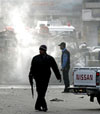 Now that three full weeks of 2007 have elapsed, how is the new year shaping up? In some ways it all depends on where you are. In Iraq General Casey has said that “extra US troops ordered to Baghdad could begin leaving by late summer.” Closer to home, there are conflicting reports about Fidel Castro’s health. But the US military has already begun “planning for mass exodus” from Cuba “when Castro dies.” Meanwhile, doubts about another Canadian federal election soon have descended on Ottawa, where Parliament will resume on Monday, January 29. A new scandal on the sea-bound coast has raised hopes for a first NDP provincial government in Nova Scotia. And (take note M. Dion) Justin Trudeau has been hanging with environmental apostle Robert Kennedy Jr. at Banff. If there are more surprises ahead anywhere we shouldn’t be surprised.
Now that three full weeks of 2007 have elapsed, how is the new year shaping up? In some ways it all depends on where you are. In Iraq General Casey has said that “extra US troops ordered to Baghdad could begin leaving by late summer.” Closer to home, there are conflicting reports about Fidel Castro’s health. But the US military has already begun “planning for mass exodus” from Cuba “when Castro dies.” Meanwhile, doubts about another Canadian federal election soon have descended on Ottawa, where Parliament will resume on Monday, January 29. A new scandal on the sea-bound coast has raised hopes for a first NDP provincial government in Nova Scotia. And (take note M. Dion) Justin Trudeau has been hanging with environmental apostle Robert Kennedy Jr. at Banff. If there are more surprises ahead anywhere we shouldn’t be surprised.
The Inscrutable Middle East …
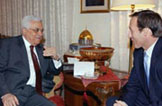 George W. Bush’s controversial plan for a (last?) fresh dose of US military might in Iraq – to finally turn it all around – remains at the centre of the big picture that most Canadians watch. And “General George Casey, the top American commander in Iraq, said Friday [January 19] that some of the extra troops that President George W. Bush ordered to Baghdad could begin leaving by late summer if conditions allow.”
George W. Bush’s controversial plan for a (last?) fresh dose of US military might in Iraq – to finally turn it all around – remains at the centre of the big picture that most Canadians watch. And “General George Casey, the top American commander in Iraq, said Friday [January 19] that some of the extra troops that President George W. Bush ordered to Baghdad could begin leaving by late summer if conditions allow.”
This may seem to feed the over-optimistic theory that Bush’s current deep hidden agenda is just to pave the way for some kind of honourable (or even apparently victorious?) US withdrawal from Iraq, sooner than most of us think. At the same time, it has also just been reported that “Iraqi Prime Minister Nuri al-Maliki proposed to President George W. Bush in November to withdraw US troops from Baghdad and let the Iraqi government take over security in the capital.”
 And then again conservative columnist Charles Krauthammer has just urged that the “Pentagon should be working on a sustainable Plan B whose major element would be not so much a drawdown of troops as a drawdown of risk to our troops. If we had zero American casualties a day, there would be as little need to withdraw from Iraq as there is to withdraw from the Balkans … We say to Maliki: Let us down, and we dismantle the Green Zone, leave Baghdad and let you fend for yourself; we keep the airport and certain strategic bases in the area; we redeploy most of our forces to Kurdistan; we maintain a significant presence in Anbar province … Then we watch. You can have your Baghdad civil war without us.”
And then again conservative columnist Charles Krauthammer has just urged that the “Pentagon should be working on a sustainable Plan B whose major element would be not so much a drawdown of troops as a drawdown of risk to our troops. If we had zero American casualties a day, there would be as little need to withdraw from Iraq as there is to withdraw from the Balkans … We say to Maliki: Let us down, and we dismantle the Green Zone, leave Baghdad and let you fend for yourself; we keep the airport and certain strategic bases in the area; we redeploy most of our forces to Kurdistan; we maintain a significant presence in Anbar province … Then we watch. You can have your Baghdad civil war without us.”
Just where Iraq will be a year from now, that is to say, remains quite unclear. But just a bit further south and west, the still quite new Canadian foreign minister Peter MacKay is in “the Middle East from January 19 to 23, 2007,” visiting “Jordan, the West Bank and Israel … to discuss how Canada can support peace efforts in the Middle East.” It may be that the deeper hidden agenda here is for MacKay to accidentally bump into Condoleeza Rice, with whom he has been no doubt altogether fraudulently romantically linked over the past several months. Meanwhile, back in Ottawa, it has been reported that “Prime Minister Stephen Harper is sending his controversial special adviser Wajid Khan on another fact-finding mission and is planning to turn some of the recommendations from Mr. Khan’s secret report on the Middle East into policy.” (Mr. Kahn, you may recall, also recently defected from the Liberals to Mr. Harper’s Conservatives in the Canadian House of Commons.)
Will Rum and Coca-Cola Rise Again Soon in Cuba?
 On Tuesday, January 16 the Associated Press was advising: “Ailing Cuban leader Fidel Castro is in very grave’ condition after three failed operations and complications from the intestinal infection diverticulitis, a Spanish newspaper reported.” But then on Friday, January 19 we heard that “Cuban leader Fidel Castro is making a slow but progressive’ recovery although his condition is serious due to his advanced age, a Spanish doctor who has examined him said.”
On Tuesday, January 16 the Associated Press was advising: “Ailing Cuban leader Fidel Castro is in very grave’ condition after three failed operations and complications from the intestinal infection diverticulitis, a Spanish newspaper reported.” But then on Friday, January 19 we heard that “Cuban leader Fidel Castro is making a slow but progressive’ recovery although his condition is serious due to his advanced age, a Spanish doctor who has examined him said.”
Whatever the exact state of Fidel’s health, if “Cubans flee in droves” for the Florida earthly paradise when he does finally die, “those intercepted at sea will likely wind up” at the Guantanamo Bay US military base in Cuba, “where nearly 400 men captured in the war on terrorism are held, creating an incredible challenge’ for US forces, the base commander said … Military officials … have begun planning for a possible mass exodus, scouting potential sites to detain migrants in tents while keeping them far from the prisoners suspected of links to al-Qaida or the Taliban.”
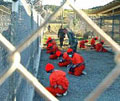 So it seems that even Cuba has now become somehow mixed in with the current troubles in the Middle East. And just to ice this particular cake, note the recent report from the Cayman Islands, which explains how “rumors have said that it’s awfully funny that as soon as they found oil off of Cuba, Fidel fell sick.” (The Cayman Islands are apparently a little concerned about fresh competition from a boosted Cuban tourism industry, if and when the current somewhat absurd ban on travel to Cuba by US citizens is also finally lifted, in the wake of Fidel’s death.)
So it seems that even Cuba has now become somehow mixed in with the current troubles in the Middle East. And just to ice this particular cake, note the recent report from the Cayman Islands, which explains how “rumors have said that it’s awfully funny that as soon as they found oil off of Cuba, Fidel fell sick.” (The Cayman Islands are apparently a little concerned about fresh competition from a boosted Cuban tourism industry, if and when the current somewhat absurd ban on travel to Cuba by US citizens is also finally lifted, in the wake of Fidel’s death.)
Is a New Age of Reason in Ottawa Really on the Horizon?
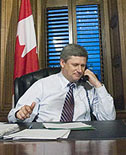 Until very recently, the conventional wisdom among most of the Ottawa punditry seemed to be that, as foolish as yet another Canadian federal election quite soon in 2007 almost certainly is, it was probably going to happen anyway. Now the message has suddenly become: “Barring a bout of parliamentary madness … we can safely say there probably won’t be a spring election and probably not one until the spring of 2008.”
Until very recently, the conventional wisdom among most of the Ottawa punditry seemed to be that, as foolish as yet another Canadian federal election quite soon in 2007 almost certainly is, it was probably going to happen anyway. Now the message has suddenly become: “Barring a bout of parliamentary madness … we can safely say there probably won’t be a spring election and probably not one until the spring of 2008.”
A good enough run of opinion polls showing the Conservatives and the Liberals very close – with the Liberals even a bit ahead lately, and no one remotely approaching majority government territory – has no doubt helped shift the mood.
Then the defection of Wajid Kahn from the Liberals to the Conservatives (followed by Liberal Jean Lapierre’s resignation from his Outremont seat in Montreal) raised the still somewhat bizarre prospect that the New Democrats alone could now sustain the Harper Conservative government in office – even if the Liberals and the Bloc Quebecois suddenly are seized by a bout of parliamentary madness.
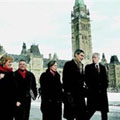 Then new Liberal opposition leader Stephane Dion’s announcement of his unusually large and even experimental “shadow cabinet,” as interesting as it no doubt is, has also seemed to suggest that the Liberals themselves really would like some extra time to consolidate and fine tune the perhaps intriguing enough new directions in which they may now be evolving.
Then new Liberal opposition leader Stephane Dion’s announcement of his unusually large and even experimental “shadow cabinet,” as interesting as it no doubt is, has also seemed to suggest that the Liberals themselves really would like some extra time to consolidate and fine tune the perhaps intriguing enough new directions in which they may now be evolving.
And then such recent headlines as “PM announces $1.5 billion in alternative energy funding,” “Tories environment plan targets homes, businesses,” and “Tories give tax credit for energy efficient homes” appear to suggest as well that Stephen Harper really does like his new job as minority prime minister very much. And to keep it he is at least very close to being almost ready to turn in his old neo-con warrior’s battle dress, for the grey flannel suit of the congenitally compromising Canadian federal politician. (On the ironic model of the ancient great Liberal guru and Incredible Canadian, William Lyon Mackenzie King – as in, e.g., “the environment if necessary but not necessarily the environment,” etc., etc., and on and on.)
Does all this mean that some new age of reason and friendly co-operation among Canadian federal politicians is finally about to descend upon Ottawa – in fulfillment of the current dreams of all the Canadian people, as defined in the two latest elections of 2004 and 2006? Probably or even almost certainly not – or at least not yet, until the voters do remind the politicians of the message in, say, even two more elections (and if they still do of course). But it may mean that federal political leaders of all stripes (including to some extent even the Bloc Quebecois?) will be trying a bit harder to pretend that they do just want to co-operate and get good things done for the higher sake of the federation, and all the solid hard-working diverse sovereign citizens who reside within its borders, peace be upon you, amen.
Does the New Fage Scandal in Nova Scotia Have Legs for the NDP?
 Wajid Kahn’s defection to the Conservatives – and the resulting razor-thin changes in strategic parliamentary voting calculations it inaugurates, on paper at least – may or may not prove good news for Jack Layton’s lately somewhat besieged federal New Democrats.
Wajid Kahn’s defection to the Conservatives – and the resulting razor-thin changes in strategic parliamentary voting calculations it inaugurates, on paper at least – may or may not prove good news for Jack Layton’s lately somewhat besieged federal New Democrats.
(The NDP has not been doing well in recent polls. And old Brian Mulroney operative Norman Spector has just suggested that “Wajid Khan’s defection to the Conservative Party has provided Stephen Harper with considerable Parliamentary clout. Contrary to many reports, the NDP does not hold the balance of power in the House; rather, when MPs reassemble in Ottawa … the Prime Minister will be able to govern with the support of any one of the opposition parties.”)
But the NDP and its supporters across the country probably do have some right to take heart from recent developments in Nova Scotia provincial politics. Very briefly, a while back Ernie Fage, a bon-vivant cabinet minister in Premier Rodney MacDonald’s new Conservative minority government, “drove after a night at a pub, banged into another car and then allegedly sped away in a cloud of booze-smelling fumes.”
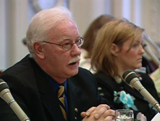 The whole thing has now come to public light, and Premier MacDonald, who was just elected last year, has not reacted well, or even just shrewdly. His shortcomings on the Fage Scandal have only underlined a growing list of similar gaffes. And his minority government is in big trouble.
The whole thing has now come to public light, and Premier MacDonald, who was just elected last year, has not reacted well, or even just shrewdly. His shortcomings on the Fage Scandal have only underlined a growing list of similar gaffes. And his minority government is in big trouble.
Note that the result of the June 2006 Nova Scotia provincial election gave Mr. MacDonald’s Conservatives 23 seats in the current 52-seat Legislative Assembly at Halifax, alongside 20 seats for the provincial New Democrats and 9 for the Nova Scotia Liberals (who are currently in the midst of another Liberal leadership race). Note too that until 1998 the New Democrats were just also-rans in Nova Scotia provincial politics, but have lately become much more than that.
The NDP in Nova Scotia won an average of only 2 seats per election, over the 10 provincial elections from 1960 to 1993. Then in 1998 it suddenly won 19 seats, and precipitated a shake-up in the Nova Scotia Legislative Assembly that led to a fresh election in 1999. This time the NDP was cut back to 11 seats, and John Hamm settled into a comfortable enough situation as a somewhat unusual Conservative premier. But in 2003 the NDP came back with 15 seats, which put Mr. Hamm’s Conservatives into a still more unusual minority-government regime.
 The youthful Rodney MacDonald, who succeeded Mr. Hamm as Conservative leader early in 2006, was supposed to be “fresh-faced and folksy, comforting to the rural Conservative base, yet shiny and new” and “a counter to the surging NDP.” Alas (or otherwise): “What actually happened is 11 months of gaffes and missteps on everything from the election spending-promise frenzy, to flip-flops on gas regulation and Sunday shopping, to the patronage plum to aide Heather Foley Melvin and the premier’s much-publicized marital split … Now it’s the Ernie Fage affair. The Tories must be asking how they could have been so wrong.”
The youthful Rodney MacDonald, who succeeded Mr. Hamm as Conservative leader early in 2006, was supposed to be “fresh-faced and folksy, comforting to the rural Conservative base, yet shiny and new” and “a counter to the surging NDP.” Alas (or otherwise): “What actually happened is 11 months of gaffes and missteps on everything from the election spending-promise frenzy, to flip-flops on gas regulation and Sunday shopping, to the patronage plum to aide Heather Foley Melvin and the premier’s much-publicized marital split … Now it’s the Ernie Fage affair. The Tories must be asking how they could have been so wrong.”
So does all this mean that Nova Scotia just might be getting its first NDP provincial government any time soon? The answer seems to be maybe, maybe not. As explained by Dan Leger in the Halifax Chronicle Herald: “First, don’t get too excited about an imminent election, because it isn’t. The NDP does not want to trigger a vote, fearing that the electorate will blame them for forcing an election to grab power … They’re well aware that Nova Scotians, in two straight elections, have chosen minority governments. It’s the will of the people right now, something that party leader Darrell Dexter has acknowledged publicly. So they’re being patient. They’re in a good spot … In many ways, Rodney MacDonald has already lost the next election, but there’s no urgency to get them out now,’ said my New Democrat friend.”
Justin Trudeau in Outremont? … Some Unsolicited Advice for Stephane Dion …
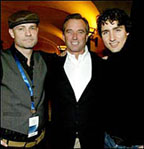 Back for a related last quick look at the minority government scene in Ottawa, old Brian Mulroney operative Norman Spector has also just added his own caveat to the sudden new conventional wisdom about the prospects for any fresh Canadian federal election in 2007.
Back for a related last quick look at the minority government scene in Ottawa, old Brian Mulroney operative Norman Spector has also just added his own caveat to the sudden new conventional wisdom about the prospects for any fresh Canadian federal election in 2007.
When you factor in all the numbers since Wajid Khan, Mr. Spector urges, Stephen Harper is now in the ultimate driver’s seat. And: “Mr. Harper is no doubt pondering whether familiarity will breed support or contempt for Mr. Dion among Canadians. If the polls turn favourable, I’m wagering that the finance minister will present a budget that none of the opposition parties, each for its own reasons, can support.” (And then of course there will have to be an election after all.)
From this angle there is still quite a lot of heat on new opposition Liberal leader Stephane Dion right now. He does seem to be doing a number of things right – and he may even himself have a certain unexpected nerdy appeal, for Canadians who at least sometimes like to pretend that they respect such things as higher learning and higher thoughts.
 But it remains easy enough to argue that his new Team Canada Grits still lack a few crucial ingredients. And this inevitably lends interest to the current speculation that Justin Trudeau (guided by his remarkable wife Sophie Gregoire?) might be a good Liberal candidate for Jean Lapierre’s freshly vacated seat in Outremont, whenever the required by-election is held there.
But it remains easy enough to argue that his new Team Canada Grits still lack a few crucial ingredients. And this inevitably lends interest to the current speculation that Justin Trudeau (guided by his remarkable wife Sophie Gregoire?) might be a good Liberal candidate for Jean Lapierre’s freshly vacated seat in Outremont, whenever the required by-election is held there.
So it is probably worth noting as well that Justin Trudeau was among the “famous and not-so-famous” who recently “brought their star-power to the Banff Springs Hotel for the annual Celebrity Sports Invitational fundraiser in support of Robert Kennedy Jr.’s Waterkeeper Alliance environmental group.”
(Kennedy has some special affection for the Banff Springs: “”I love it. I came up here first when I was 12-years-old with my father for the Calgary Stampede. There are still people working in the hotel who were working here then. They remember me because of some damage I did to one of the rooms.” Mmm.)
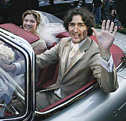 Many Liberals long seasoned in the trenches, and perhaps especially in Quebec, still seem to see the 30-something Justin Trudeau as an extreme political lightweight, who can have no real claims on such a safe Liberal seat as Outremont in Montreal. And it is said that M. Dion in particular would like to see more Liberal women candidates, that Justin Trudeau is not popular at all in Quebec, and on and on.
Many Liberals long seasoned in the trenches, and perhaps especially in Quebec, still seem to see the 30-something Justin Trudeau as an extreme political lightweight, who can have no real claims on such a safe Liberal seat as Outremont in Montreal. And it is said that M. Dion in particular would like to see more Liberal women candidates, that Justin Trudeau is not popular at all in Quebec, and on and on.
Here at counterweights we just have to look at the number of additional visitors any mention of Justin Trudeau (or Alexandre Trudeau, or Sophie Gregoire, or Zoe Bedos) regularly brings to our site, to believe that he can lay claim to some mystic mass magic, which Stephane Dion’s new Liberal dream team could find useful in the struggles ahead. And as a novice MP he would probably have the good sense not to really bother anyone for some decent interval at least. In the real world of even M. Dion’s emerging new Liberal Party of Canada, it will no doubt be a surprise if Justin Trudeau does become the Liberal candidate in Outremont. But stranger things have happened in Canadian politics lately – and could no doubt happen again.

